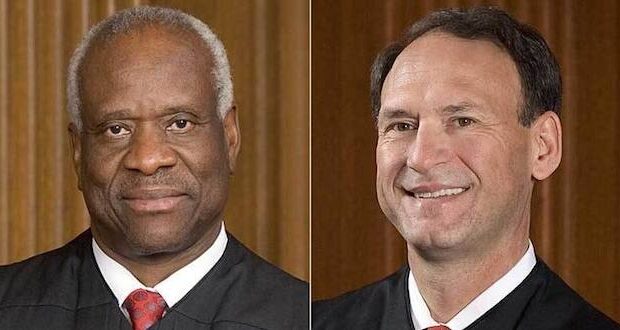The opening day of the new Supreme Court session had a few fireworks. Justices Clarence Thomas and Samuel Alito criticized the decision to turn down a case involving a county clerk who opposed same-sex marriage.
“By choosing to privilege a novel constitutional right over the religious liberty interests explicitly protected in the First Amendment, and by doing so undemocratically, the court has created a problem that only it can fix, ”Thomas wrote in a four-page statement that was joined by Alito.
The case involved Kim Davis, a Kentucky county clerk and a professing Christian who ordered her department in 2015 to stop issuing marriage licenses, shortly after the U.S. Supreme Court legalized same-sex marriage nationwide.
Although Davis’ order applied to all couples – and not just to same-sex couples – she was nevertheless sued by those who were refused licenses. Davis had requested an accommodation that did not require her name to be placed on the license of a same-sex couple, due to her strong Christian beliefs. (The state’s executive branch eventually honored her request.)
She lost in district court and at the U.S. Sixth Circuit Court of Appeals, and then appealed to the U.S. Supreme Court. Liberty Counsel, which represented Davis, argued she had the legal right under Supreme Court precedent to stop issuing marriage licenses.
Thomas and Alito said the Supreme Court created the problem by legalizing same-sex marriage and bypassing the “democratic process.”
“Several members of the court noted that the court’s decision would threaten the religious liberty of the many Americans who believe that marriage is a sacred institution between one man and one woman,” Thomas wrote, referring to an argument he and Chief Justice John Roberts made in 2015. “If the states had been allowed to resolve this question through legislation, they could have included accommodations for those who hold these religious beliefs.”
With Justice Ruth Bader Ginsburg’s death and the retirement of Justice Anthony Kennedy in 2018, only three members of the majority in the gay marriage case remain: Justices Stephen Breyer, Sonia Sotomayor and Elena Kagan.
Barrett’s confirmation would cement a 6-3 conservative majority on the court, and she has compared her approach to the law generally to that of her mentor, Justice Antonin Scalia, one of the dissenters in the gay marriage case and other prominent cultural issues.
While reversing the court’s decision in the homosexual marriage case would be difficult, Thomas’ statement underscored liberal fears that their time of influence on the court may be over.
–Alan Goforth | Metro Voice
 Metro Voice News Celebrating Faith, Family & Community
Metro Voice News Celebrating Faith, Family & Community 








